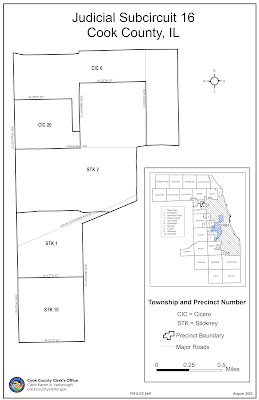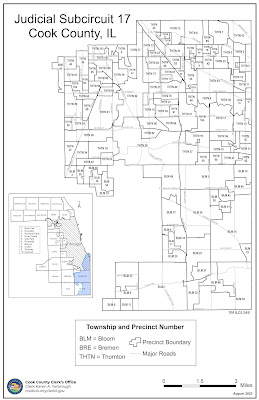Letters. If people remember anything about what Democratic Party Committeemen (they weren't "committeepersons" then) did during the Bad Old Days (
for our purposes we'll use this phrase to refer to the reign of Richard J. Daley, pictured here), they'll remember letters.
A letter from one's home committeeman was necessary in order for one to be considered for any public sector job -- and not a few private sector jobs, besides. (
What? You think Madigan was the first pol to place people with ComEd?)
Of course, there were
LETTERS and there were
letters back in the day. The latter got you an interview, but no guarantee of a job, and no guarantee you'd keep the job if you did get it. Some people moved up in public careers without ever getting a
new letter after the first one. Persons with particular skills were always needed (still are) to decipher the books, or keep the machines running -- but, if you went back far enough in the employment history of anyone of a certain age, there was sure to be some sort of a letter in there somewhere. If not every one of them, darn near anyone who ever wrote letters at one time had a letter of their own.
And, of course, those persons blessed with
LETTERS were pretty much assured of guaranteed employment from the person to whom the letter was directed. Some didn't even need to show up for work at all in the Bad Old Days -- not as long as they worked their precinct anyway, and so long as they didn't run afoul of their clout.
But letters, as important as they were, were not the currency of the Old Machine. They were just a means to an end, that end being: Jobs. Every Committeeman in the good graces of Richard J. Daley had a certain number of jobs that could be doled out to top precinct captains or assistants. The number varied from ward to ward. Critics of the patronage system have correctly noted that committeemen in certain ethnic communities had control of more and better jobs than other committeemen, though the voters in these less favored neighborhoods were no less numerous, and perhaps even more reliable. The 11th had more jobs than anyone, of course, because that was Da Mare's ward.
A committeeman might distribute his jobs solely to relatives and friends, or perhaps to those willing to give the committeeman a 'taste' of every paycheck. This was corruption, surely, and some people eventually went to jail over this kind of misbehavior but, more important, from a party organization standpoint, it was bad politics.
The purpose of any party organization in our system, in the Bad Old Days and now, is to win elections.
In the Bad Old Days, the committeeman was supposed to use his jobs to build a reliable cadre of precinct captains. One was not supposed to waste a
LETTER on someone who did not know how to work his assigned precinct or precincts.
And while there may have been (and often were) all sorts of other activities (good, bad, criminal, or merely questionable) involved in precinct work, one core function was what today we would consider "polling." The committeeman was expected to find out how his ward would perform before the election; his captains would tell him what the results would be before any votes were cast. And they'd all better be right. All their jobs depended on it. (I have used 'ward' here on purpose; there were committeemen in the townships even in the Bad Old Days -- Da Mare rather quaintly referred to them as the county towns -- but the expectations, and the corresponding opportunities, were far fewer.)
I was still in college when Richard J. Daley died (December 20, 1976 for those of you who might have grown up elsewhere). I'd been at a prayer breakfast he attended just a couple of weeks before he dropped dead in his doctor's office. But there had been 3,000 or so others present for that same breakfast, and I was seated about a mile away from the head table, so I believe I can confidently disclaim any blame.
Anyway, someone decided that the 1977 St. Patrick's Day Parade would be a proper vehicle for public mourning of the fallen Boss. I gather that every Committeeman was asked to do their part. Certainly the 49th Ward, where Neil Hartigan was Committeeman, wanted to make a big impression. The net was cast so wide even I got hauled in.
Hartigan (not yet Attorney General -- he'd just been defeated for reelection as Lieutenant Governor) wanted to involve Loyola students in the 49th Ward's parade unit. I was the student body president. The head of the Loyola College Democrats, who was a neighborhood guy and active in the 49th Ward Organization, thought it would be a good idea for me to accompany him to a meeting with Hartigan. I guess my participation would supposedly make the school's participation more official. Looking back, I can only imagine what the Jesuits would have said about
that.
But I went to the meeting, at the old Elks Club, at Ridge and Thome, right behind Misericordia. I'd helped build floats for Homecoming parades when I was in high school in the suburbs so I knew something about twisting paper napkins in chicken wire and making it look like
something. More or less, anyway. I'd never been to the St. Patrick's Day Parade, but this all seemed like great fun until Hartigan asked me point-blank, "How many students will you turn out?"
I was heading to law school by then, although I don't recall whether I'd been accepted or not. I gave, what seemed to me, to be a good, lawyerly answer, "Well, sir, it depends."
I prefer to think that Hartigan regarded me more with pity than with scorn. But it might have been either. He tried again, more slowly this time: "How many students will you turn out?"
Completely rattled by the fact that what I thought was a good and sufficient answer had obviously fallen so flat, I babbled on (and on) about, well, the parade would take place right around midterms, and then there's the weather, of course, more if the weather's nice, but not so many if it's cold or rainy.... Finally, the guy who brought me elbowed me, or stomped on my foot, or gave me some other, similarly subtle signal to
please shut up, and, as soon as I paused, blurted out "250."
Hartigan, satisfied at last, moved on to whatever other business needed attention.
I kept my temper until my host and I were headed back to campus. "Why the Hell did you say we'd get 250 people?" I might have used other adjectives and adverbs, but this was the 1970s and language was kinder and gentler then.
"It'll be alright," my host assured me. "He just needed a number." He elaborated: "This wasn't an
important number -- like how many votes you'd turn out in your precinct on Election Day -- it was just a number." (In the end, we did turn out at least 250 people, not all of them capable of standing on their own by the time the parade actually started, but these were shunted into the middle of the mass of flesh moving down State Street. Honor was satisfied.)
That was as close as I ever came to providing numbers for the Old Machine, important or otherwise. I also never got to be a judge. There may be -- I begin to think, after roughly 30 years of considering the subject -- some correlation.
For better or worse, party organizations were intimately connected to their communities in the Bad Old Days. That's how good organizations knew which races they would win, and by exactly how much. We can catalog all the bad things about the Bad Old Days some other time. (Yes, we would need to set aside a lot of time.)
But let's stay close to the topic: Are party organizations as 'wired-in' to their communities today?
In running FWIW all these years, I've become familiar with a lot of ward or township groups that give every outward appearance of being very democratic -- small 'd' intended. They enroll members and sometimes charge dues, the members elect officers, and the members vote on the organization's endorsements (which don't always match what the county Party has slated). More than once I've reported about differences between a ward or township's endorsements and the recommendations made by the Committeeperson. How can you get more democratic -- small 'd' intended -- than having an organization that doesn't even agree with its titular leader?
But it occurs to me that all the members of these modern organizations are self-selected. They come out of interest and stay out of affinity with their like-minded fellows. Obviously, the volunteers, however they arrived, have been sufficient to get the petitions signed. But... are they representative of the community as a whole?
In the modern age, with real pollsters ringing our phones every night at dinnertime, all the many direct mail pieces, and a steady stream of commercials helping to guide the formation of our collective opinions, does it really matter who the Committeeperson is, or how the ward or township organization is structured?
In any given election cycle, for somewhere around 20 or 25 people, namely, the slated countywide judicial candidates and the alternates, the 80 ward and township committeepersons are the most important persons in the world. But are these 80 individuals important to anyone else? (I'm not talking about Committeepersons who hold other elected offices, too -- these persons would have importance in those other roles, presumably. Hopefully.) But as Committeepersons? Do Committeepersons still matter? How? Why?
I'll hang up now and listen to your answer.







































